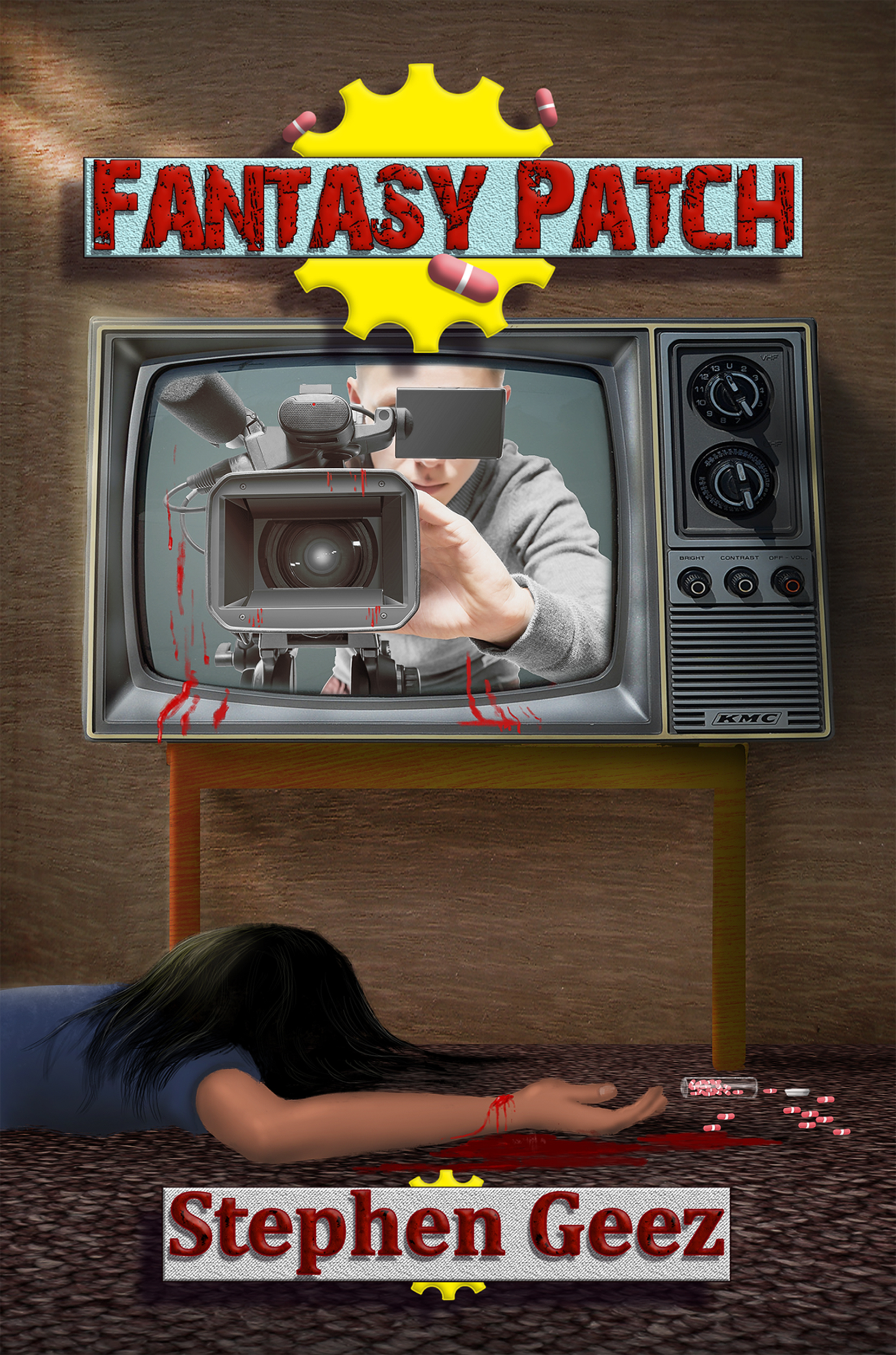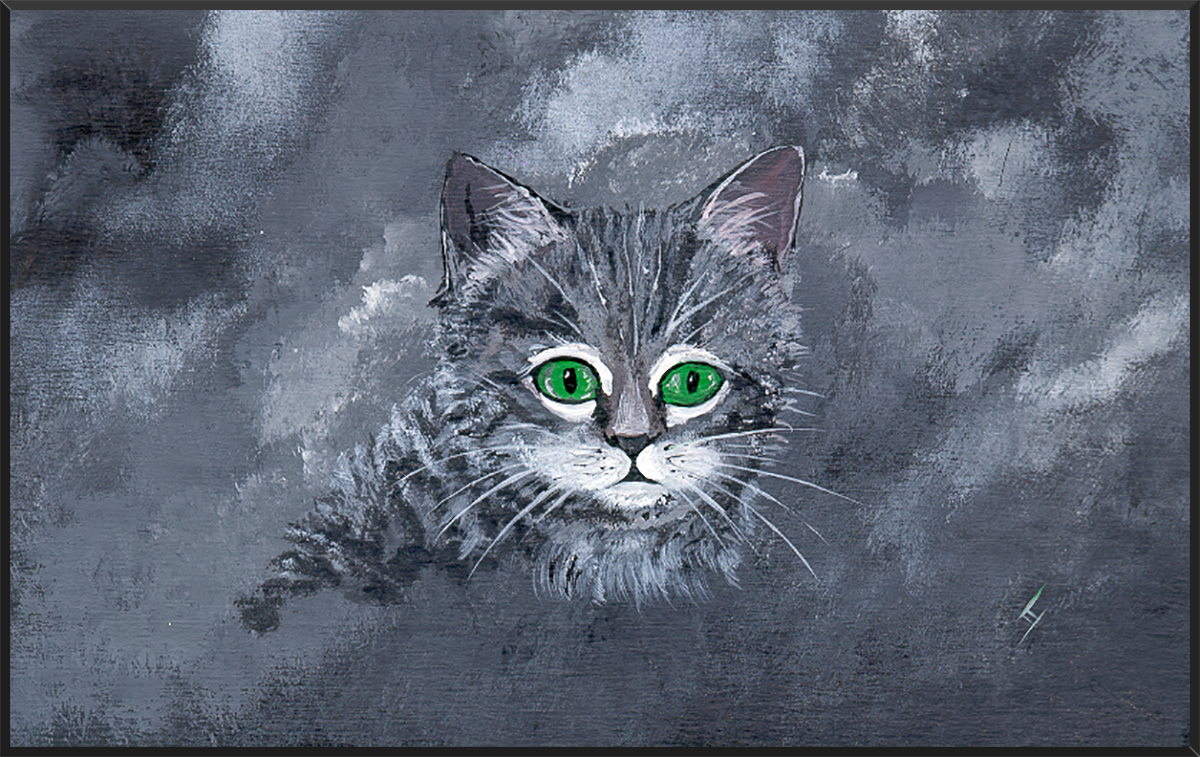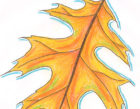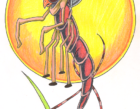Attention Pay
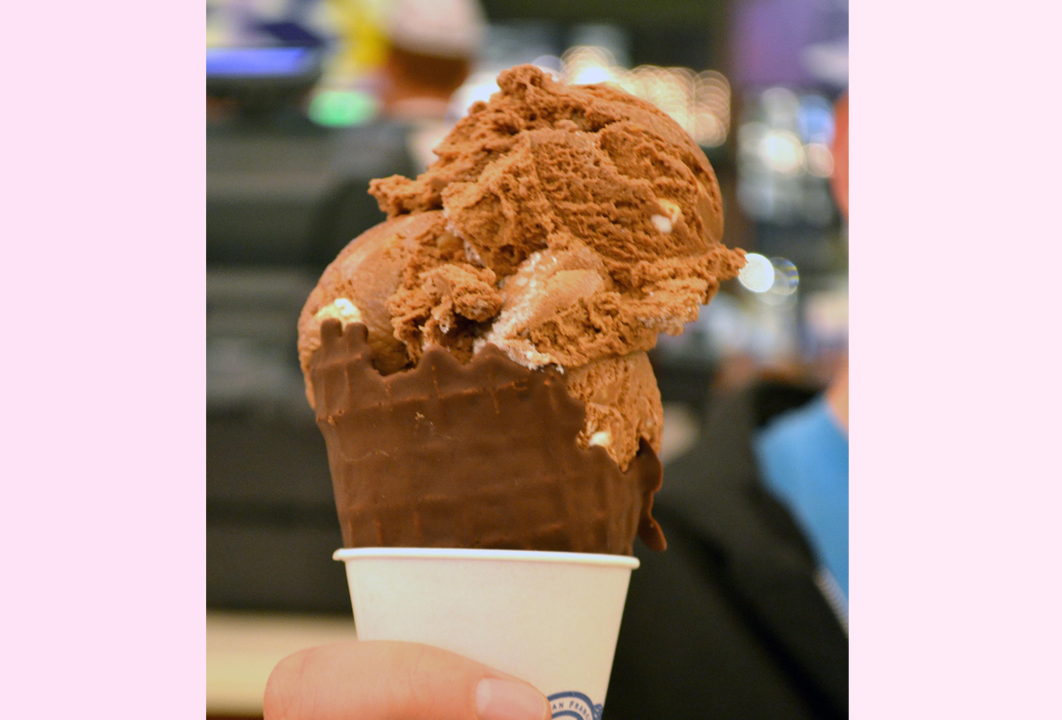
Attention Pay
Short Fiction by Stephen Geez
A smart young man who knows the words but struggles to pay attention sits on his boardwalk bench, salty sea breeze swirling around him, the ice cream of his sugar-cone melting in the warm Florida sunlight.
And he cries.
His routine etching deep grooves through simple days, Jimmy has learned to find near-contentment in the markers of predictable moments reliably reminding him what must come next. A beeping alarm always means bedspread toilet shower clothing door-lock bike boardwalk donut-stand work. Tourists at the bike-rental counter mean half-day or whole-day ID credit card sign here. Owner Willie reminds him when it’s time to pick up their lunch at Chick-On-Stick, then at 6:00 time to quit for the day. “Don’t forget to stop for ice cream,” adds the skinny old bike-rental owner, his face a totem of ridges and wrinkles tanned to the color of finger-burnished pennies. Willie never says much more than that, preferring to sit on his stool and pay attention to everyone and everything happening on the boardwalk.
An evening ice cream from Maureen’s stand, then a seat on his favorite bench with plenty of time to eat it—that used to be the best part of Jimmy’s day, certainly nothing to cry about. Then two months and three days ago Lila came to work for Maureen, and that complicated everything.
A voluntary resident at the group home two blocks behind the bluff, Lila introduced herself to Jimmy her first day on the job, then boldly declared, “I’m high-function special needs.” Jimmy soon learned those are about the biggest words she knows, but her ideas often prove bigger than words, and by gosh she sure does know how to pay attention to people. Willie once remarked that she’s not much to look at, but Jimmy considers her quite pretty, indeed, and somehow she looks even more beautiful each day, a notion he finds himself paying quite a bit of attention to, even at the oddest times.
Used to be, he would choose a flavor for his daily double-dip cone as he walked to the stand, but lately he’s been squandering those minutes wondering which outfit she might be wearing, which hints of color might adorn her eyelids and lips and nails. Sure enough, he finds himself at the counter, people waiting in line, and has no idea what to order. It’s getting to where she just picks a flavor for him.
Somehow, she always knows exactly the one he wants.
That ugly spotty dog wanders down the beach, sniffing at tourists and wagging his tail. Some shoo him away; others pet him, offer a treat. The seagull squadron overhead swoops in to steal his morsels, always paying attention to where the food is stashed, noticing coolers and baskets and sacks and pockets and little kids who might be startled into dropping their ice-cream cones.
 Jimmy wipes the tears from his eyes and gazes down the boardwalk to where Lila works the counter. A slash of evening sunlight cuts through the interior gloom, making her glow and appear to be melting. That big guy with the dark bushy hair is still there, leaning on the counter, chatting up Lila and grinning incessantly. Jimmy always talks to her, but never for more than a few minutes because she has a job to do. She wants to save up to move someplace where nobody uses or breaks or steals her things. Yes, Jimmy has been paying attention.
Jimmy wipes the tears from his eyes and gazes down the boardwalk to where Lila works the counter. A slash of evening sunlight cuts through the interior gloom, making her glow and appear to be melting. That big guy with the dark bushy hair is still there, leaning on the counter, chatting up Lila and grinning incessantly. Jimmy always talks to her, but never for more than a few minutes because she has a job to do. She wants to save up to move someplace where nobody uses or breaks or steals her things. Yes, Jimmy has been paying attention.
It’s not right that the grinning man doesn’t buy ice cream. He probably doesn’t even know how to eat it. Gobble it too fast, and you get brain freeze! Wait too long, and it melts all over your hand, even your clothes. Ice cream is a commitment, best savored as a perfectly timed indulgence, each layer opening itself to infinitely exquisite possibilities in the instant it melts. No wonder Jimmy always fits a daily cone into the routine of deep grooves etched through simple days.
The buckle on his sandal is coming loose. He spends too long puzzling over what to do about it, but he is distracted because that big bushy-haired guy is still down at the ice-cream stand. Jimmy refuses to let the frustration make him cry again, but seeing him talking to Lila is more than he can take. The view from his bench is ruined now, and it’s too early to head home to his two-room apartment up Bleser Lane, so he has no choice but to give up his bench time today.
Opting to go on foot, he stomps his way along the boardwalk, then heads up the access trail behind the beach and finds himself wandering down a familiar sidestreet where the ramps and concrete steps are lined with lots of steel rails, all leading to houses up the rise. He used to skateboard here, doing tricks and impressing his friends, a smart foster boy living with the Jenkins family in their ramshackle house behind the bluff.
It happened at age fifteen, Jimmy a tenth-grader, almost six years ago. Somebody stole his helmet, and Mrs. Jenkins refused to get him another, so he went boarding without protection. He took that rail right over there, down along the concrete steps, then jumped to the curb, showing off for some girls watching from the street.
But he paid too much attention to the girls, not enough to the street.
All that time in hospitals, five operations, the state rehab facility, therapists insisting he might still be smart if he would just learn to pay attention, Mrs. Jenkins refusing to take him back he’s not right he could be dangerous just look at him . . . yet now he wants to show this awful place to Lila, to lay bare the connection between a future he wanted and the life he now lives. Maybe then she’ll understand why nothing is where it needs to be until he finds the right way to fit it in, to link it to what comes before and after, each day a near-contentment of recurring loop reminding him what comes next.
Except when it gets complicated.
Little Braeden comes coasting down the roadway on his bike. Jimmy tries not to pay him any attention, but every time he sees the sandy-haired ten-year-old he can’t help but feel happy for a moment before the sadness reminds him those connections now hurt.
A foster placement who’s been living with the Jenkins family since last year, Braeden used to come around the bike-rental and visit Jimmy, sometimes helping him clean the bikes and pump the tires and fix the chains. One day with Willie off running errands in town, he tried to tell Jimmy what happened that made him a foster boy, but he started crying, and Jimmy forgot to listen to the words because the tears made him just listen to how Braeden feels. What mattered right then was that Jimmy always paid attention.
Closer now, Braeden notices Jimmy standing awkwardly beside the road. The youngster nods as he coasts by, but quickly looks away, embarrassed.
One day the boy’s friends saw him hanging out with that “retard” at the bike-rental, and they teased him. The few times Braeden came by after that, his eyes darted around to see who else might be paying attention, and he always left right away.
When Jimmy counted twenty-six days without seeing Braeden anywhere, he made the big mistake of riding his bike over to the Jenkins house and asking about him. Mrs. Jenkins got angry and told Jimmy to go away, then called the police, who came to Willie’s shop the next day and told Jimmy he better stop paying attention to Braeden. Willie got mad about it, too, but not at Jimmy. “It’s a messed-up world,” he said, shaking his head before returning to his stool. He also missed Braeden coming around, the way the boy asked so many questions that Willie wound up talking more than he used to.
“You’re a good guy,” Braeden says, startling Jimmy, who hadn’t realized the boy circled back and stopped in the middle of the road. Braeden eyes the crusted cone clutched in the man’s hand, dried ice-cream drips coating his hand. “Some kids was talkin’ bad, is all—’cause you act so weird.”
The boy executes a couple of figure-eights in the street, and Jimmy pays very close attention because watching Braeden reminds him to have faith that hurts don’t always have to break connections, that sometimes they’re just stretched too thin to see for a while. Braeden must need more time to figure out where to fit in.
“Sorry,” says the boy, stopping again.
“We’re still friends,” Jimmy says.
“Yeah,” Braeden agrees. He stands on his pedals and races up the hill, out of sight.
Several cars drive by, each slowing to eye the man standing absently beside the road. Jimmy pays attention to everyone who stares, but that brings angry looks, and suddenly he panics for not knowing what comes next. Needing to pay attention to what he knows, he hurries along the road, follows the access trail, and traces the boardwalk route to his seat on the bench.
There’s a mess on his hand, the cone glued to his fist, which means way too late to eat his ice cream. That grinning guy with the dark bushy hair is still leaning on the counter, but Lila is looking down the boardwalk, paying attention to Jimmy.
And that feels good.
She does that a lot lately, but maybe thinking about him complicates her routine, too, the same way Jimmy sometimes can’t sleep at night, always thinking about her.
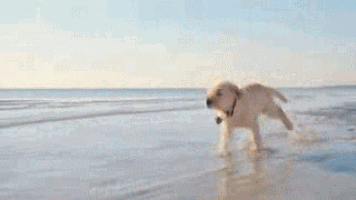 That ugly spotty dog wanders back up the beach, his squadron of gulls patrolling above, but Jimmy doesn’t pay them much attention because he is walking up the boardwalk now toward the ice-cream stand. He will tell that man to leave so he can talk to Lila. He will punch him in the nose, if that’s what it takes.
That ugly spotty dog wanders back up the beach, his squadron of gulls patrolling above, but Jimmy doesn’t pay them much attention because he is walking up the boardwalk now toward the ice-cream stand. He will tell that man to leave so he can talk to Lila. He will punch him in the nose, if that’s what it takes.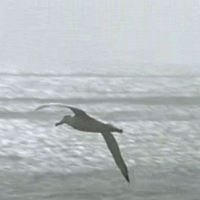
“Jimmy!” Lila blurts, eyeing the empty cone, the mess on his hand. “What are you thinking?”
“I’m thinking about you,” he pronounces, ignoring the big guy glaring with that too-common you’re-a-retard look on his face.
Lila grins, those beautiful eyes glistening, her color today hinting at lavender, or maybe fuchsia or some other word Jimmy knows but doesn’t care to wonder right now. “Well, mister,” she pronounces, “let’s get you clean.” She comes around from behind the counter and firmly takes Jimmy’s arm.
The grinning guy stops grinning as Jimmy tells him, “You go home now.”
“Yeah, Gus,” Lila agrees, “I’m busy now.” She leads Jimmy behind the stand where a short hose dribbles water into a bucket, then holds him tenderly while rinsing the goop from his hand. She moves even closer, hair touching his face, fragrance tickling his nose, her warmth taunting him as the sunshine melts and drips down their bodies . . . and she holds his hand long after the water scrubs it clean.
“Who is Gus?” Jimmy wonders.
“Oh, he just likes me, but I don’t like him. He’s too pushy.”
“He acts like he’s your boyfriend,” Jimmy says, the unspoken concept of jealousy finding new meaning among his big words.
“I know—but he keeps talking till I get brain freeze,” she says, giggling.
Jimmy laughs with her because he’s paying attention to exactly what she means.
“Lila,” Maureen says, peeking out the back window with a knowing smile, “why don’t you knock off early and have some ice cream with your friend down there on the bench?”
Lila shoos Jimmy toward his familiar spot, promising she’ll come in a few minutes.
As he waits, that ugly spotty dog wandering the beach could very well turn into a horse, his squadron of gulls into pterodactyls; the boards in the walk could turn to snakes, the sky into streaks of lavender and fuchsia . . . Jimmy would never even notice because this smart young man who knows the words has something more important on his mind.
And when Lila joins him on the bench, she’s holding two plastic dishes with upside-down ice-cream cones. “I like my ice cream this way,” she announces, “’cause then I can take my time.”
Jimmy finds himself thrilled by the vary notion that he keeps knowing precisely what she means. Sampling the chilly confection, he says, “Hey, this is exactly the flavor I want.”
She smiles and waits for him to spoon another bite before tasting a bit of her own. After several minutes of both taking their time, she pauses and looks serious, then leans closer to whisper, “I saw you crying, Jimmy.”
“I thought you picked Gus,” he says, a hint of sadness drifting by, then moving on, no place for it to connect.
Now Lila’s eyes fill with tears. “I just thought Gus would make you hurry up.”
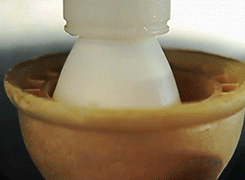 “But you really picked me,” he said, forgetting to listen to her words because the tears made him just listen to how Lila feels. “Gus doesn’t fit in.”
“But you really picked me,” he said, forgetting to listen to her words because the tears made him just listen to how Lila feels. “Gus doesn’t fit in.”
She puts her arms around him, and he holds her like no other can possibly exist in the world.
It seems that love is a commitment, best savored as a perfectly timed indulgence, each heart opening itself to infinitely exquisite possibilities in the instant it melts.
Maybe now a beeping alarm means bedspread toilet shower clothing door-lock bike group-home Lila boardwalk donut-stand ice-cream stand work . . .
She whispers, “I like how you eat ice cream,” proving a good-hearted soul who doesn’t know big words can be very smart, indeed.
“I like how you’re not afraid of letting it get mushy,” Jimmy declares. “Maybe we can try mixing two flavors together!”
They both laugh at the very idea, which proves that even a smart soul who knows big words really can find the most remarkable reason to pay attention.



